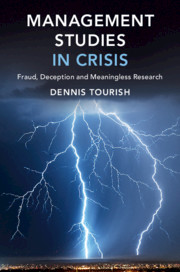Book contents
- Management Studies in Crisis
- Management Studies in Crisis
- Copyright page
- Dedication
- Contents
- Tables
- Acknowledgements
- Introduction: the Crisis in Management Studies
- Chapter 1 Flawed from the Get-Go: the Early Misadventures of Management Research
- Chapter 2 How Audit Damages Research and Academic Freedom
- Chapter 3 ‘When the Levee Breaks’: Academic Life on the Brink
- Chapter 4 The Corruption of Academic Integrity
- Chapter 5 Paradise Lost but Not Regained: Retractions and Management Studies
- Chapter 6 The Triumph of Nonsense in Management Studies
- Chapter 7 Flawed Theorising, Dodgy Statistics and (In)Authentic Leadership Theory
- Chapter 8 The Promises, Problems and Paradoxes of Evidence-Based Management
- Chapter 9 Reclaiming Meaningful Research in Management Studies
- Chapter 10 Putting Zest and Purpose Back into Academic Life
- Notes
- Index
Chapter 7 - Flawed Theorising, Dodgy Statistics and (In)Authentic Leadership Theory
Published online by Cambridge University Press: 05 July 2019
- Management Studies in Crisis
- Management Studies in Crisis
- Copyright page
- Dedication
- Contents
- Tables
- Acknowledgements
- Introduction: the Crisis in Management Studies
- Chapter 1 Flawed from the Get-Go: the Early Misadventures of Management Research
- Chapter 2 How Audit Damages Research and Academic Freedom
- Chapter 3 ‘When the Levee Breaks’: Academic Life on the Brink
- Chapter 4 The Corruption of Academic Integrity
- Chapter 5 Paradise Lost but Not Regained: Retractions and Management Studies
- Chapter 6 The Triumph of Nonsense in Management Studies
- Chapter 7 Flawed Theorising, Dodgy Statistics and (In)Authentic Leadership Theory
- Chapter 8 The Promises, Problems and Paradoxes of Evidence-Based Management
- Chapter 9 Reclaiming Meaningful Research in Management Studies
- Chapter 10 Putting Zest and Purpose Back into Academic Life
- Notes
- Index
Summary
There are at least ninety-three academic journals devoted exclusively to ‘leadership’, in one context or another. At the time of writing, Google Scholar lists 244,000 articles and Amazon identifies over 100,000 books with ‘leadership’ in their titles – figures that must have been obsolete as soon as I typed them. Clearly, there is a fascination with the subject, fuelled by airport-bookshop business books and outlets such as Harvard Business Review, which seem convinced that all our problems can be solved if only the right leader is in place. Leaders are often depicted as some version of Superman – strong, confident, bold, decisive, empathic and visionary. Researchers identify an ever greater range of attributes and skills that all leaders should aspire to develop and which a select few are deemed to possess. Nor does there seem to be any cap on the number of consultants who promise to teach the skills that are said to be needed. CEOs and wannabe CEOs find much of this appealing. After all, it is more satisfying to believe that you are transforming the world rather than simply manipulating figures on a spreadsheet.
- Type
- Chapter
- Information
- Management Studies in CrisisFraud, Deception and Meaningless Research, pp. 161 - 188Publisher: Cambridge University PressPrint publication year: 2019
- 2
- Cited by



